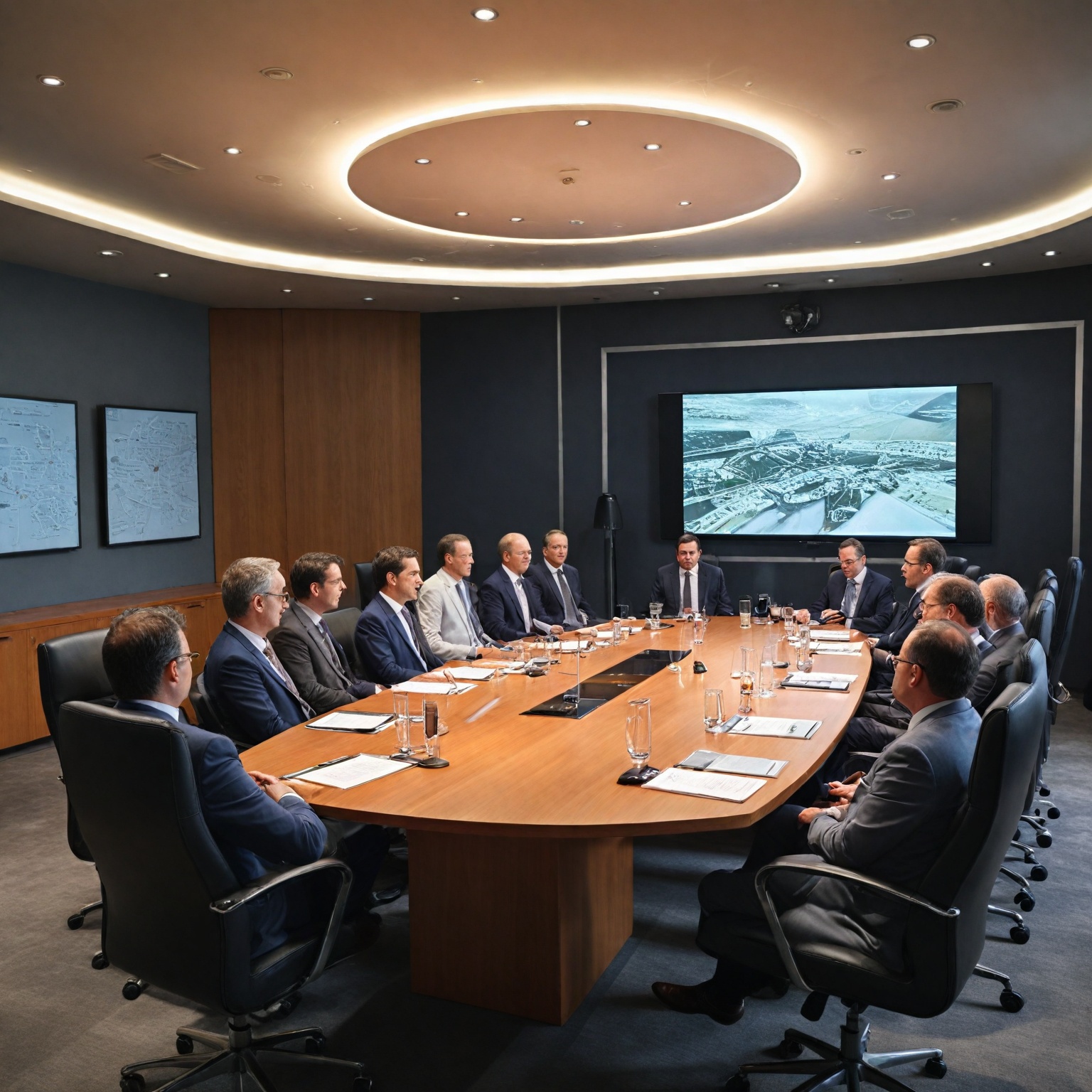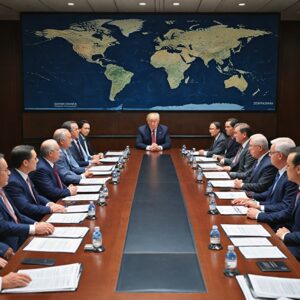Summary
Renault’s stock plunged by 18% in mid-2025 following the company’s announcement of lowered financial guidance and the appointment of Duncan Minto as interim Chief Executive Officer (CEO). This sharp decline reflected investor concerns over Renault’s operational challenges, including increased costs, restructuring expenses, and significant capital losses, notably a €0.9 billion write-down related to its Nissan stake. The leadership change came amid heightened market uncertainty as Renault navigated a complex competitive environment marked by weak European automotive demand and intensifying competition from lower-cost Chinese electric vehicle manufacturers.
The interim CEO appointment followed the departure of Luca de Meo, who had led Renault for five years and was credited with efforts to restore the company’s market position. Minto, previously Chief Financial Officer with over 25 years of experience at Renault, was tasked with stabilizing the company during this critical transition while the Board pursued a permanent successor. Concurrently, Renault unveiled its “Futurama” strategic plan, aiming to guide the company’s evolution over the next five years through new vehicle launches and diversification, including expansion into the defense sector.
These developments unfolded against a backdrop of broader industry headwinds, including a sustained downturn in the European car market and mounting margin pressures due to rising R&D expenditures and shifting capitalization rates. Renault’s revised outlook and leadership uncertainty intensified investor apprehension, contributing to heightened stock volatility and a cautious market sentiment.
Despite these challenges, Renault remains focused on executing its longer-term “Renaulution” roadmap, which encompasses phases of restructuring, innovation, and transformation aimed at enhancing profitability and competitiveness. The company’s ability to manage operational difficulties, stabilize leadership, and implement its strategic vision will be critical to its recovery and future performance in an evolving automotive landscape.
Overview
Renault experienced a significant drop in its stock price, falling by 18% following the announcement of lowered financial guidance and the appointment of a new interim CEO. The situation prompted increased scrutiny of the company’s preparation and auditing of financial statements and financial information to ensure transparency and accuracy. Amid these developments, Luca de Meo, the new interim CEO, presented his “Futurama” plan to the board’s strategic committee. This comprehensive strategy outlines Renault’s direction over the next five years, including the launch of future vehicle models and diversification efforts, notably into the defense industry.
Background
In the wake of Renault Group’s recent financial challenges, including an $11.2 billion loss tied to its Nissan stake, the company has experienced significant leadership changes. Following the departure of CEO Luca de Meo, who led the company for five years and was credited with efforts to restore Renault to a stronger market position, the Board of Directors, chaired by Jean-Dominique Senard, initiated a pre-established succession plan to appoint a new CEO.
Duncan Minto, who joined Renault Group as Chief Financial Officer (CFO) in March 2025, was appointed interim CEO amid this transition period. Born in 1975 and a graduate of the University of St Andrews, Minto brings 25 years of experience in finance, investor relations, regional finance leadership, and brand-level financial strategy, which the company expects will provide stability and continuity. As part of the Renault leadership team, Minto reports directly to de Meo until the latter’s departure and is anticipated to continue and accelerate ongoing initiatives within the group.
This leadership change occurred just weeks ahead of Renault Group’s half-year financial results announcement scheduled for July 31, 2025, a critical moment for the company as it navigates market pressures and seeks to reassure investors. Meanwhile, the search for a permanent CEO remains well advanced, with the Board actively pursuing candidates to fill the role on a long-term basis.
Events Leading to Stock Decline
In mid-2025, Renault experienced a significant decline in its stock price, falling by approximately 18% following the company’s announcement of lowered financial guidance for 2025 and a major leadership change. The Board of Directors revealed a downward revision of the company’s financial outlook, reflecting challenges such as increased operating costs, restructuring expenses, and capital losses, notably including a €0.9 billion capital loss from the disposal of Nissan shares in late 2023 and impairments on vehicle developments and production assets.
Compounding the negative market sentiment was the announcement on July 15, 2025, of the appointment of Duncan Minto as interim Chief Executive Officer (CEO) of Renault S.A., succeeding Luca de Meo who departed to lead luxury conglomerate Kering. Minto, previously the Chief Financial Officer with over 25 years of experience at Renault, was tasked with providing stability during the executive transition, while the search for a permanent CEO was underway. Although Minto’s appointment was viewed as a stabilizing factor, the leadership uncertainty amid lowered guidance contributed to investor concerns.
These events occurred against a backdrop of broader industry challenges. European automakers, including Renault, were grappling with rising costs, weak demand, and intensifying competition from Chinese electric vehicle manufacturers capable of producing at lower costs. The European car market had been experiencing declining sales, with an 18% slump in August 2025 and continued decreases in September, marking the first consecutive monthly declines in two years.
Renault’s financial results leading up to this period had shown improvement, with record revenue of €52.4 billion and an operating margin increase to 7.9% in 2023; however, the subsequent write-downs and restructuring costs indicated ongoing operational difficulties that contributed to the revised outlook. Furthermore, the capital loss related to the Nissan stake intensified existing tensions within the Renault-Nissan alliance, adding another layer of complexity to the company’s strategic environment.
Together, these financial setbacks, market pressures, and leadership changes culminated in a sharp decline in Renault’s stock value, reflecting investor uncertainty about the company’s near-term prospects and ability to navigate the evolving automotive landscape.
Market Impact
Renault Group’s recent strategic challenges and leadership changes have had a significant impact on its market performance. The company’s lowered financial guidance, driven by a combination of increased R&D expenditures and deteriorating automotive market conditions, has contributed to a notable decline in investor confidence. Specifically, Renault experienced a negative R&D effect of €115 million, attributed to higher gross R&D spendings and a reduced capitalization rate in 2024 compared to 2023. Although partially offset by billings to partners and lower amortization of capitalized R&D expenses, these factors have pressured the company’s margins.
The broader automotive market trends have also weighed heavily on Renault’s outlook. The UK automobile market, in particular, has faced a decline exacerbated by the COVID-19 pandemic, while competitive pressures and a continued retail market contraction have further challenged the company’s revenue growth. Despite a modest revenue increase of 2.5% to €27.6 billion in the first half of the financial year, free cash flow projections were revised downward to between €1 billion and €1.5 billion from over €2 billion previously.
These financial pressures have been reflected in Renault’s stock performance. The stock price showed increased volatility with an estimated intraday swing range of 5.40%. Trading activity has indicated medium risk, with the stock nearing support levels around €42.49, suggesting potential short-term buying opportunities amid oversold conditions on the RSI14 indicator. However, volume declines alongside price drops signal caution, as the risk-reward balance remains sensitive to further market movements.
Adding to market uncertainty, the announcement of Duncan Minto as Renault Group’s new Chief Finance Officer on March 1, 2025, marked a notable leadership transition. Minto’s extensive experience within the company, including previous CFO roles at Dacia and Alpine, positions him as a key figure in navigating Renault through this turbulent period. Nevertheless, the interim CEO appointment and other leadership changes have intensified investor concerns regarding the company’s strategic direction and alliance stability, particularly given ongoing tensions related to its Nissan stake.
Board and Management Response
Following the recent challenges faced by Renault, including the announcement of lowered financial guidance and significant stock declines, the Board of Directors has taken decisive steps to stabilize the company’s leadership and reaffirm its strategic direction. Chaired by Jean-Dominique Senard, the Board has initiated the process of appointing a new permanent CEO based on a pre-established succession plan, ensuring continuity while managing the transition effectively. Luca de Meo, who has served as CEO for five years and worked to restore Renault to its prominent industry position, will continue in his role until his departure date.
In the interim, Duncan Minto, who joined Renault Group as Chief Financial Officer in March 2025, has been appointed as the interim CEO. This appointment is part of the company’s effort to maintain stable leadership during this critical period, with the search for a permanent CEO described as “well underway” by the Board.
Additionally, former Renault executive Thierry Piéton expressed pride in his nine years with the Group, highlighting the commitment of the teams and the company’s operational turnaround efforts, which underscores the management’s focus on strategic execution and investor confidence amidst current challenges.
The Board also continues to review the company’s financial and non-financial communication policies to ensure transparency and strengthen stakeholder trust throughout the transition.
Industry Context and Competitive Landscape
The automotive industry in Europe has faced significant challenges recently, characterized by rising production costs, weak consumer demand, and increasing competition from Chinese electric vehicle manufacturers capable of producing more affordable models. In 2023, European car sales experienced consecutive monthly declines for the first time in two years, with an 18% slump in August followed by further decreases in September, reflecting broader market difficulties. The UK market, in particular, has seen a downturn partly due to the lingering effects of the COVID-19 pandemic.
Within this challenging environment, Renault Group has navigated a complex competitive landscape. The company’s sales and market share had previously reached a low in 2013 but recovered steadily, returning to 2009 volumes by 2017 and reclaiming the second position among European automotive brands in 2016, behind Volkswagen and ahead of Ford. However, Renault faces stiff competition from prominent global manufacturers, including Growings Mobility, Oldsmobile, Citroen International, Mercedes-Benz, and Volvo.
Despite market pressures, Renault Group reported positive financial results in 2023, with revenues rising 13.1% to €52.4 billion and operating margins reaching the upper end of guidance. Net income turned positive at €2.3 billion, a €3.0 billion increase compared to the previous year. Worldwide vehicle sales increased by 9% to 2,235,000 units, and the company improved its net cash financial position to €3.7 billion as of the end of 2023.
Renault’s strategic response to the competitive pressures includes a three-phased plan comprising “Resurrection,” “Renovation,” and “Revolution,” aiming to enhance revenues and profitability through cost optimization, technological innovation, and product development. The company is also focusing on electric vehicles, with models like the Renault R5 E-Tech contributing to its market presence in this segment. Nonetheless, Renault continues to face margin pressures from increased research and development expenses, with a noted negative impact of €115 million due to higher gross R&D spending and changes in capitalization rates, partially offset by partner billings and amortization adjustments.
Analysis and Commentary
Renault’s stock experienced a significant decline of 18% following the announcement of lowered financial guidance and the appointment of a new interim CEO, Duncan Minto. This leadership change has introduced uncertainty among investors, compounded by the company’s recent financial challenges linked to its alliance with Nissan, which resulted in an $11.2 billion loss. The tense dynamics within the Renault-Nissan partnership have further contributed to market apprehension, despite recent efforts to amend their alliance agreement to allow greater operational flexibility.
Financially, Renault showed strong performance in 2023 with a notable increase in revenue to €52.4 billion, a 13.1% rise from the previous year, and an improved operating margin reaching between 7% and 8%. However, the company’s stock volatility has increased, with daily average fluctuations of around 2.26% and a recent intraday range of €0.55, reflecting heightened market nervousness. The stock is currently considered oversold based on RSI14 technical indicators, suggesting that although a further drop is possible, a rebound may follow.
Strategically, Renault has focused on optimizing cost structures and improving product development to strengthen its financial position amid challenging market conditions, including the decline of the UK automobile market influenced by COVID-19. The company also continues to monitor and revise its financial and non-financial communication policies to maintain transparency and investor confidence. Nonetheless, the combination of leadership transition, alliance-related losses, and market volatility has led to a cautious outlook from analysts and investors alike.
Aftermath and Future Outlook
Following the announcement of lowered guidance and the appointment of Duncan Minto as interim CEO, Renault experienced a significant decline in its stock price, dropping as much as 18% in a single trading session, marking its worst day since March 2020. The decline was driven by concerns over a sharp fall in free cash flow, which came to just €47 million in the first half of the financial year, heavily impacted by a negative working capital requirement of around €900 million caused by delayed billings and a shrinking European passenger car and van market. This market deterioration, compounded by increased commercial pressure from competitors and an ongoing decline in retail demand, has cast uncertainty over Renault’s short-term financial stability.
In response to these challenges, Renault has committed to intensifying cost-cutting measures in the second half of the year to improve margins, aiming to counteract the negative effects of rising R&D expenditures and a lower capitalization rate of R&D investments. Despite these efforts, some analysts warn that longer-term pressures on the automotive market could persist, potentially hindering a rapid recovery.
Strategically, Renault is continuing to implement its “Futurama” plan, unveiled by former CEO Luca de Meo, which outlines the company’s vision for the next five years, including diversification into the defense sector and the development of future vehicle models. This plan complements the broader Renaulution roadmap initiated in 2021, focused on restoring profitability through phases of “REsurrection,” “REnovation,” and “Revolution,” transforming Renault into a next-generation automotive company.
The leadership transition sees Duncan Minto, who joined as CFO in March 2025, stepping in as interim CEO, overseeing day-to-day management alongside Chairman Jean-Dominique Senard. The search for a permanent CEO is reported to be “well underway,” though no timeline has been provided. Renault’s ability to navigate these operational and market challenges, execute its strategic plans, and stabilize leadership will be critical to its future outlook amid an evolving automotive landscape.
The content is provided by Jordan Fields, Fact-Nest













